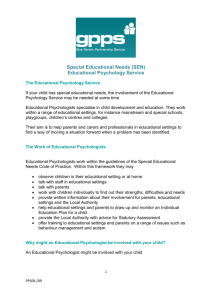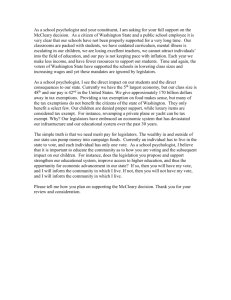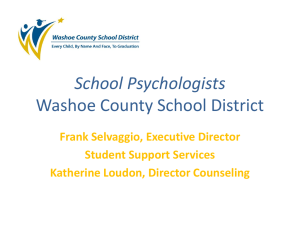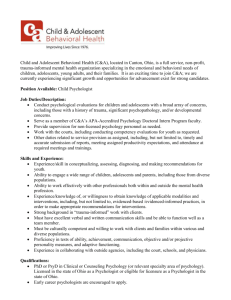Kansas School Psychologist Evaluation Protocol (KSPEP)
advertisement
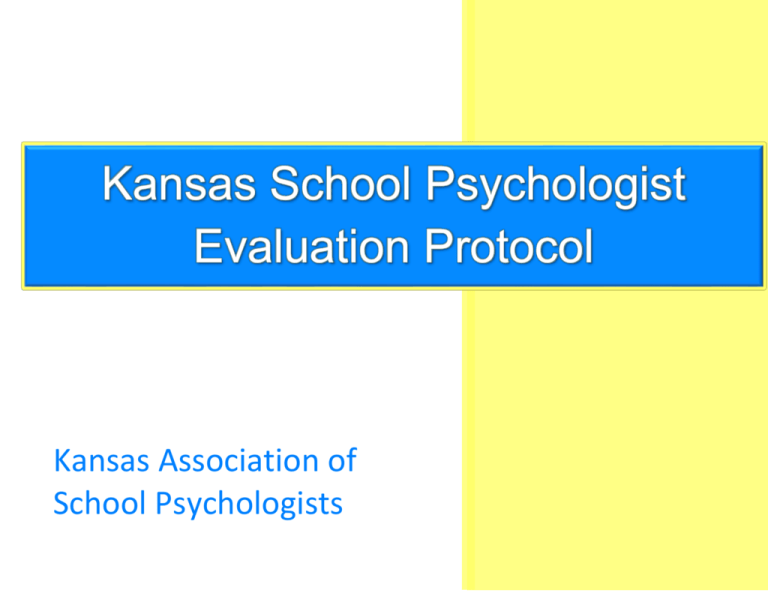
Kansas School Psychologist Evaluation Protocol Kansas Association of School Psychologists 9/28/2013 Draft KANSAS SCHOOL PSYCHOLOGIST EVALUATION PROTOCOL (KSPEP) Table of Contents KANSAS SCHOOL PSYCHOLOGIST EVALUATION PROTOCOL (KSPEP) .................................................................................................................3 PHILOSOPHY OF KSPEP ................................................................................................................................................................................................... 3 THE PURPOSE OF KSPEP ................................................................................................................................................................................................. 3 CONSTRUCTS, COMPONENTS AND RUBRICS ........................................................................................................................................................................ 4 DEVELOPMENT OF THE RUBRIC ......................................................................................................................................................................................... 4 USING THE ASSESSMENT TOOL ......................................................................................................................................................................................... 5 EVALUATION RUBRICS ...................................................................................................................................................................................6 DOMAIN 1: ASSESSMENT, DATA-BASED DECISION MAKING, AND ACCOUNTABILITY ............................................................................................... 7 DOMAIN 2: INTERVENTIONS AND INSTRUCTIONAL SUPPORT TO DEVELOP ACADEMIC, SOCIAL, AND LIFE SKILLS ................................................. 10 DOMAIN 3: CONSULTATION AND COLLABORATION ................................................................................................................................................ 13 DOMAIN 4: LEADERSHIP........................................................................................................................................................................................... 15 DOMAIN 5: CORE PROFESSIONALISM ...................................................................................................................................................................... 13 KSPEP SUMMARY RATING SHEET ................................................................................................................................................................................... 14 SCHOOL PSYCHOLOGIST GOAL SETTING/TRACKING FORM ............................................................................................................................................... 16 COMPENDIUM OF ARTIFACTS AND EVIDENCE ............................................................................................................................................... 17 PARENT INTERVIEW ...................................................................................................................................................................................................... 18 PRINCIPAL OR ADMINISTRATOR INTERVIEW ....................................................................................................................................................................... 19 SCHOOL PSYCHOLOGIST OBSERVATION FORM ................................................................................................................................................................... 23 CROSSWALK COMPARISON OF KANSAS SCHOOL PSYCHOLOGIST EVALUATION PROTOCOL WITH THE NASP MODEL FOR COMPREHENSIVE INTEGRATED SCHOOL PSYCHOLOGICAL SERVICES.............................................................................................................................................................................................. 24 NASP MODEL 10 DOMAINS OF PRACTICE ...................................................................................................................................................... 25 ACKNOWLEDGEMENTS .................................................................................................................................................................................................. 28 REFERENCES ................................................................................................................................................................................................................ 28 KANSAS SCHOOL PSYCHOLOGIST EVALUATION PROTOCOL DESIGN PARTICIPANTS ................................................................................................................... 28 Kansas School Psychologist Evaluation Protocol (KSPEP) Philosophy of KSPEP The Kansas Association of School Psychologists (KASP), in accordance with the National Association of School Psychologists (NASP), support the importance of the accurate evaluation of school personnel. With the increase of support personnel in schools due to federal initiatives, such as No Child Left Behind (NCLB), state departments and district administrators need to address the issue of appropriate evaluation tools for instructional and support personnel. In response to this need, KASP has developed an evaluation tool that aligns with NASP’s Model for Comprehensive and Integrated School Psychological Services (2010), or the NASP Practice Model, and the guidelines of the Kansas State Department of Education. This evaluation tool is designed to define and promote “best practice” to enhance student outcomes; in addition, to an evaluation process that is specific to school psychologists. This model delineates the training and the professional services that can be expected from school psychologists across the10 domains of practice. These domains are the following: 1. Data-based decision making and accountability 2. Consultation and collaboration 3. Interventions and instructional support to develop academic skills 4. Interventions and mental health services to develop social and life skills 5. School-wide practices to promote learning 6. Preventive and responsive services 7. Family-school collaboration services 8. Diversity in development and learning 9. Research and program evaluation 10. Legal, ethical and professional practice The Purpose of KSPEP The purpose of this evaluation tool is to provide a framework for input by supervisors and other personnel through a description of key roles and responsibilities of school psychologists. This tool would also assist school administrators' recognition of effective school psychology practice and support ongoing professional development for their school psychology staff. Alignment of evaluation standards with the NASP Practice Model (2010), affords consistency of practice, defines contemporary school psychology, and promotes the delivery of broad based school psychological services to children, families, and schools. Constructs, Components and Rubrics Similar to the use of the Interstate Teacher Assessment and Support Consortium (InTASC) and the Interstate School Leadership Licensure Consortium (ISLLC) Standards utilized by the Kansas Department of Education in developing the evaluation protocol for teachers and administrators, KASP has utilized foundational principles as recommended by the National Association of School Psychologists in the development of the KSPEP. The components of this evaluation tool reflect all 10 domains of practice (see Crosswalk Comparison). Service delivery models will vary from district to district. Not all of these domains may be executed by an individual school psychologist within a given year. Therefore, supervisors and/or administrators may want to adapt or excerpt material from this tool as needed, with the hope that the role and function of school psychologists will evolve into a broader based service. Development of the Rubric This instrument was developed by a workgroup of KASP. The Kansas School Psychologists Evaluation Protocol is patterned after the Kansas Educator Evaluation Protocol (KEEP). The development of this rubric began when KASP requested permission to develop an appraisal tool that was appropriate to the roles and functions of school psychologists. To ensure the relevance and to promote the practice of school psychology, the KASP protocol is aligned with the Model for Comprehensive and Integrated School Psychological Services (National Association of School Psychologists [NASP], 2010) in developing the domains and indicators of professional practice. This rubric was also developed to align with the State of Kansas Department of Education’s guidelines in personnel assessment. Using the Assessment Tool Most of this rubric can be utilized by an administrator who is highly familiar with a school psychologist’s work, supplemented by input from other consumers of school psychological services. However, some items require more technical or advanced knowledge of school psychological services, and should only be evaluated by a “qualified practitioner”. Key considerations for using this evaluation tool include the following: This tool is designed to be one measure, or piece of information, used in the personnel evaluation of school psychologists. Additional information should be considered when making evaluation decisions. This tool should be used as a self-assessment by a school psychologist. The ratings could be shared with a supervisor and considered in the evaluation process to determine final ratings and areas for future professional growth. School psychologists should provide evidence, or artifacts, to support their self-ratings on this tool. Examples include: student progress monitoring data, educational evaluation reports, examples of student work, surveys/feedback on interactions with families, school staff, and community partners. This tool should be completed by a supervisor who is familiar with school psychology practices, professional best practices, and ethical principles. When possible, a credentialed school psychologist should be the evaluator at a minimum serve as one level of review. The activities listed for the rating categories (Highly Effective, etc) are examples. This list is not exhaustive and a rating at that level does not require evidence of each listed practice. A school psychologist may be involved in other activities that should be considered when selecting the appropriate rating. Supervisor ratings on the tool will be more accurate and valid when based on first-hand knowledge of the school psychologist’s job performance. Observations, review of provided evidence/artifacts and self-ratings, and input from other school staff would be informative. The final tool ratings should be reviewed and discussed by the supervisor and school psychologist. Identifying areas of effectiveness and exemplary practice as well as areas in need of improvement are essential for supporting school psychological practices that enhance student academic and mental health outcomes. Scoring of the tool should take into consideration the domains determined applicable to the individual school psychologist. Normative data has not been collected for the tool so decisions about criteria and overall classifications of effectiveness should be made a the local level EVALUATION RUBRICS DOMAIN 1: ASSESSMENT, DATA-BASED DECISION MAKING, AND ACCOUNTABILITY School psychologists utilize their knowledge of data-based decision making and accountability, diversity in development and learning, as well as research and program evaluation to assist staff with effective decision making regarding student needs Indicator 1.1: Utilizes appropriate assessment and data collection methods Part of the School Psychologist’s role? No; Indicator Not Applicable to this Employee Highly Effective (4) School Psychologist fulfills the criteria for Level 3 and additionally -Applies evaluation data and findings to intervention, instruction, programming, and services through written reports, intervention plans, and meetings/conferences with parents and/or school staff. Comment Required: Yes Effective (3) School Psychologist uses assessment and data collection methods that are School Psychologist uses assessment and data collection methods that are -Appropriate for the intended purpose, -Appropriate for the student, and -Inappropriate for purpose and/or student, or -Appropriate and individualized for the specific student’s cultural, linguistic and disability background, and -Of sufficient variety for the intended purpose. Part of the School Psychologist’s role? No; Indicator Not Applicable to this Employee Yes; Indicate domain(s) in which this Employee is involved: Academic Social-Emotional Behavioral Rating: School Psychologist fulfills the criteria for Level 3 and additionally -Serves as a member of school building level teams (e.g., school improvement team, intervention team, etc.), School Psychologist contributes to school-wide assessment practices in a manner that meets the expectations of the role/school(s). Example activities include -Conducts a needs assessment to guide the development and delivery of building/district school-wide programs, -Collects, or assists with collection, of student data to inform core curriculum and instructional practices, -Conducts evaluation of school-wide practices and programs to ensure effectiveness and guide continuous improvements, or -Researches and helps select assessments for universal screening, -Assists with the development and/or delivery of staff professional development to support school-wide assessment practices. Ineffective (1) School Psychologist uses assessment and data collection methods that are Rating: 1.2: Contributes to school-wide assessment and data-based practices for academic, socialemotional, and behavioral domains. Developing (2) -Summarizes universal screening and/or benchmarking data, -Applies data to curricular decisions and/or instructional practices. -Administered, scored, and interpreted correctly -Are administered, scored, or interpreted incorrectly. But are -Limited in variety for the intended purpose, or -Limited in individualization for the specific student(s). School Psychologist is -Responsive to opportunities to contribute to school-wide assessment practices but contributions are insufficient to meet expectations of school(s)/role, and -Involved in continued professional growth and learning regarding school-wide practices. School Psychologist -Lacks knowledge about schoolwide assessment and data-based decision making practices, -Lacks knowledge about the collection and use of school-wide data, and/or -Fails to take advantage of opportunities to engage in schoolwide assessment practices. DOMAIN 1: ASSESSMENT, DATA-BASED DECISION MAKING, AND ACCOUNTABILITY, continued Indicator Highly Effective (4) Effective (3) 1.3: Contributes to progress monitoring and data-based decisions regarding intervention practices for academic, social-emotional, and behavioral domains. School Psychologist fulfills the criteria for Level 3 and additionally School Psychologist contributes to progress monitoring and databased decisions regarding intervention practices in a manner that meets the expectations of the school(s)/role. Part of the School Psychologist’s role? Example activities include No; Indicator Not Applicable to this Employee -Conducts evaluation of intervention practices and programs to ensure effectiveness and guide continuous improvements, Yes; Indicate domain(s) in which this Employee is involved: -Conducts supplemental diagnostic assessments to assist in intervention selection, -Researches and helps select assessments for progress monitoring, -Assists with the development and/or delivery of staff professional development to support intervention practices. -Summarizes progress monitoring data, and School Psychologist fulfills the criteria for Level 3 and additionally School Psychologist conducts evaluations that are School Psychologist conducts evaluations that are School Psychologist conducts evaluations that are -Effectively communicates evaluation findings to school staff through written reports and conferences, and/or -Compliant with federal and state regulations -Compliant with federal and state regulations -Not compliant with federal and state regulations -Appropriate for the student being evaluated, and But are -Inappropriate for the student being evaluated. Academic Social-Emotional Behavioral -Serves as a member of student level teams (e.g., intervention team, problem solving team, etc.), Rating: 1.4: Conducts special education evaluations to inform eligibility, service, and programming decisions. Part of the School Psychologist’s role? No; Indicator Not Applicable to this Employee Yes Rating: -Utilizes evaluation findings to inform accurate eligibility, placement, and service decisions. -Collects, or assists with collection, of student progress monitoring data, Developing (2) Ineffective (1) School Psychologist is School Psychologist -Responsive to opportunities to contribute to progress monitoring and data-based decisions regarding intervention practices but contributions are insufficient to meet expectations of school(s)/role, and -Lacks knowledge about databased problem solving practices, -Involved in continued professional growth and learning regarding progress monitoring and databased decision making practices. -Lacks knowledge about the collection and use of progress monitoring data, and/or -Fails to take advantage of opportunities to engage in progress monitoring practices. -Applies progress monitoring data to intervention practices and decisions about need for additional services/supports. -Informative for instructional and/or programming purposes. -Limited in appropriateness for the student being evaluated and/or -Limited in providing instructionally relevant information. DOMAIN 1: ASSESSMENT, DATA-BASED DECISION MAKING, AND ACCOUNTABILITY, continued Indicator 1.5: Completes evaluations in a timely manner. Highly Effective (4) Effective (3) Developing (2) Completed all in a timely manner Few evaluations completed after compliance due dates for reasons outside the school psychologist’s control Few evaluations completed after compliance due dates for reasons within the school psychologist’s control Multiple evaluations completed past the compliance due dates School Psychologist fulfills the criteria for Level 3 and additionally School Psychologist utilizes technology to meet the expectations of role and responsibilities. School Psychologist is School Psychologist -Involved in continued professional growth and learning regarding the use of technological tools and programs, and/or -Lacks knowledge about the use of technological tools and programs, Rating: 1.6: Utilizes technology as part of data-based decision making practices. Rating: -Utilizes technological tools and programs in innovative ways to meet the needs of school(s) and/or enhance job performance, -Provides mentoring and coaching to colleagues regarding the use of technological tools and programs, . Example activities include using technological tools to -collect assessment data, when appropriate, -score data, -summarize data, -graph data, and/or -share data and findings with others. -Knowledge and skill with technological tools and programs is insufficient to meet expectations of role/school(s). Ineffective (1) -Lacks the skills needed to use technological tools and programs, and/or -Fails to engage in professional growth and learning to gain needed knowledge and skills. DOMAIN 2: INTERVENTIONS AND INSTRUCTIONAL SUPPORT TO DEVELOP ACADEMIC, SOCIAL, AND LIFE SKILLS School psychologists utilize their knowledge of intervention and instructional support, mental health, prevention, and response to assist with the development and delivery of services to students to improve learning and student outcomes. Indicator 2.1: Contributes to schoolwide curricular and instructional practices for academic, social- emotional, and behavioral domains. Part of the School Psychologist’s role? No; Indicator Not Applicable to this Employee Yes; Indicate domain(s) in which this Employee is involved: Academic Social-Emotional Behavioral Highly Effective (4) Effective (3) School Psychologist fulfills the criteria for Level 3 and additionally School Psychologist contributes to school-wide curricular and instructional practices in a manner that is consistent with the expectations of the role/school(s). Example activities include -Serves as a member of school building level teams (e.g., school improvement team, intervention team, etc.), -Conducts evaluation of schoolwide practices and programs to ensure effectiveness and guide continuous improvements, or -Assists with the development and/or delivery of staff professional development to support school-wide practices. Rating: 2.2: Contributes to intervention practices for academic, socialemotional, and behavioral domains. Part of the School Psychologist’s role? No; Indicator Not Applicable to this Employee Yes; Indicate domain(s) in which this Employee is involved: -Researches and helps select instructional strategies, approaches, or programs, -Assists staff in learning and implementing new instructional strategies, approaches, or programs, Developing (2) Ineffective (1) School Psychologist is School Psychologist -Responsive to opportunities to contribute to school-wide curriculum and instruction practices but contributions are insufficient to meet expectations of role/school(s), and -Lacks knowledge about curriculum and standards for academic, social-emotional, and behavioral domains -Involved in continued professional growth and learning regarding curriculum and instruction for academic, social- emotional, or behavioral domains. -Assists in the collection of information about implementation integrity. -Lacks knowledge about instructional strategies and approaches for academic, socialemotional, and behavioral domains, and/or -Fails to take advantage of opportunities to engage in continued professional growth and learning. -Assists with student safety and bullying activities. School Psychologist fulfills the criteria for Level 3 and additionally -Serves as a member of student level teams (e.g., intervention team, problem solving team, etc.), -Conducts evaluation of intervention practices and programs to ensure effectiveness and guide continuous improvements, or -Assists with the development and/or delivery of staff professional development to School Psychologist contributes to intervention practices in a manner that meets the expectations of the role/school(s). Example activities include - Researches and helps select intervention strategies and approaches for school(s), -Helps develop intervention plans for individual students or small groups of students, -Applies progress monitoring data School Psychologist is School Psychologist -Responsive to opportunities to contribute to intervention practices but contributions are insufficient to meet expectations of school(s)/role, and -Lacks knowledge about intervention strategies and practices, -Involved in continued professional growth and learning regarding intervention practices. - Fails to take advantage of opportunities to engage in continued professional growth and learning. DOMAIN 2: INTERVENTIONS AND INSTRUCTIONAL SUPPORT TO DEVELOP ACADEMIC, SOCIAL, AND LIFE SKILLS, continued Indicator Academic Social-Emotional Behavioral Highly Effective (4) support intervention practices. Effective (3) Developing (2) Ineffective (1) to intervention practices and decisions about need for additional services/supports. -Assists staff in learning and implementing new intervention strategies, approaches, or programs, Rating: -Provides intervention services to individual students or small groups, or -Assists in the collection of information about implementation integrity. 2.3: Contributes to crisis response and intervention practices. Part of the School Psychologist’s role? No; Indicator Not Applicable to this Employee Yes Rating: School Psychologist fulfills the criteria for Level 3 and additionally -Conducts evaluation of crisis response and intervention practices to assess effectiveness and guide continuous improvements, or -Assists with the development and/or delivery of staff professional development on crisis response and intervention. -Collaborates with community agencies to provide coordinated response and services to crisis situations. School Psychologist contributes to crisis response and intervention practices in a manner that meets the expectations of the role/school(s). Example activities include - Assists in the development of crisis response and intervention plans, -Participates in school-wide crisis response and intervention training, -Provides crisis intervention services to students, staff, and community. School Psychologist is School Psychologist -Responsive to opportunities to contribute to crisis response and intervention practices but contributions are insufficient to meet expectations of school(s)/role, and -Lacks knowledge about crisis response and intervention practices. -Involved in continued professional growth and learning regarding crisis response and intervention. - Fails to take advantage of opportunities to engage in continued professional growth and learning DOMAIN 2: INTERVENTIONS AND INSTRUCTIONAL SUPPORT TO DEVELOP ACADEMIC, SOCIAL, AND LIFE SKILLS, continued Indicator Highly Effective (4) 2.4: Utilizes information about student background and characteristics to inform instruction, intervention, and service delivery decisions. School Psychologist fulfills the criteria for Level 3 and additionally Rating: -Assists with the development and/or delivery of staff professional development on student diversity. -Provides mentoring and coaching to colleagues regarding issues of diversity and student learning, -Applies knowledge in innovative ways to assist students, schools, and/or corporation. For example, addressing issues of disproportionality in special education identification or suspension/expulsion data. Effective (3) Developing (2) Ineffective (1) School Psychologist School Psychologist School Psychologist -Demonstrates an understanding of the influence of diversity factors through recommended strategies, interventions, and/or programming, and -Is involved in continued professional growth regarding student diversity and academic, social-emotional, and behavioral outcomes -Knowledge and skills meet the expectations of the role and school(s) population. But practices -Lacks an understanding of the influence of factors such as culture, linguistic, socioeconomic status, gender or gender identity, national origin, religion, disability, health status on student learning and behavior. -Demonstrate limited application of this knowledge to instructional practices and programming/service delivery. - Fails to take advantage of opportunities to engage in continued professional growth and learning. DOMAIN 3: CONSULTATION AND COLLABORATION School psychologists utilize their knowledge of school-wide practices to promote learning as well as consultation and collaboration to assist staff in creating and maintaining effective learning environments. Indicator Highly Effective (4) 3.1: Engages in consultation and collaboration with school staff. School Psychologist fulfills the criteria for Level 3 and additionally Rating: -Assists with the development and/or delivery of staff professional development on collaboration and consultation. Effective (3) School Psychologist effectively engages in consultation and collaboration with school staff in a manner that meets the expectations of the role/school(s). Developing (2) School Psychologist School Psychologist -Is involved in continued professional growth regarding consultation and collaboration strategies, -Lacks knowledge and skills about effective consultation strategies and practices, and/or Example activities include However individual’s practices -Provides mentoring and coaching to colleagues regarding consultation strategies. - Assists teachers with identifying concerns to target through intervention practices, -Applies knowledge in innovative ways to assist students, schools, and/or corporation. For example, designing a process for collaborative team meetings. -Supports teachers with intervention implementation through coaching, providing feedback, modeling, etc., Ineffective (1) -Demonstrate limited application of knowledge and skills to expected roles and responsibilities. - Fails to take advantage of opportunities to engage in continued professional growth and learning. -Works well with others as part of a team (e.g., intervention team, problem solving team, multidisciplinary team, case conference committee) and/or -Utilizes facilitation and conflict resolution skills and strategies. 3.2: Engages in consultation and collaboration with parents and families. Rating: School Psychologist fulfills the criteria for Level 3 and additionally -Assists with the development and/or delivery of staff professional development on collaboration and consultation. -Provides mentoring and coaching to colleagues regarding consultation strategies. School Psychologist effectively engages in consultation and collaboration with parents and families in a manner that meets the expectations of the role/school(s). School Psychologist School Psychologist -Is involved in continued professional growth regarding consultation and collaboration strategies, -Lacks knowledge about effective consultation strategies and practices, and/or Example activities include - Discusses parent concerns and provides suggestions for strategies to use at home, -Clearly explains assessment data and intervention strategies, However individual’s practices do not -Demonstrate application of this knowledge to expected roles and responsibilities - Fails to take advantage of opportunities to engage in continued professional growth and learning. DOMAIN 3: CONSULTATION AND COLLABORATION, continued Indicator Highly Effective (4) Effective (3) -Applies knowledge in innovative ways to assist students and families. -Explains school procedures for services such as special education, intervention, etc. - Conducts and/or assists with parent education sessions and trainings -Clearly explains evaluation findings following special education evaluation, and Developing (2) Ineffective (1) -Answers questions clearly and comprehensively. 3.3: Engages in consultation and collaboration with community agencies and providers. Rating: School Psychologist fulfills the criteria for Level 3 and additionally -Assists with the development and/or delivery of staff professional development on collaboration and consultation. -Provides mentoring and coaching to colleagues regarding consultation strategies. -Applies knowledge in innovative ways to assist students, families, schools, and community, -Conducts professional development for community agencies and providers School Psychologist effectively engages in consultation and collaboration with community agencies in a manner that meets the expectations of the role/school(s). School Psychologist School Psychologist -Is involved in continued professional growth regarding consultation and collaboration strategies, -Lacks knowledge about effective consultation strategies and practices, and/or Example activities include However individual’s practices do not -Contacts community providers to obtain information needed for instructional programming, -Clearly explains school procedures for services and practices, -Refers students and families to community providers for needed services, -Communicates with community providers in a clear and ethical manner. -Demonstrate application of this knowledge to expected roles and responsibilities - Fails to take advantage of opportunities to engage in continued professional growth and learning. DOMAIN 4: LEADERSHIP School psychologists develop and sustain professional involvement and leadership to ensure the continued learning and effective school psychological services to schools, families, and students. Indicator 4.1: Seeks professional growth and learning opportunities to advance own knowledge and skill Rating: Highly Effective (4) School Psychologist fulfills the criteria for Level 3 and additionally -Reflects critically on own skills and identifies professional learning needs, -Shares newly learned knowledge and practices with colleagues and school staff, -Seeks opportunities to provide professional learning sessions for colleagues and school staff, and 4.2: Contributes to School and/or Profession of School Psychology Rating: School Psychologist fulfills the criteria for Level 3 and additionally -Assumes leadership positions in professional organizations or school or district committees, -Mentors school psychology practicum students and interns. Effective (3) Developing (2) Ineffective (1) School Psychologist School Psychologist School Psychologist -Responds well to constructive feedback, -Attends mandatory professional learning events -Fails to seek or take advantage of opportunities to engage in professional learning, and/or -Utilizes feedback to identify areas for professional growth, But does not -Initiates attendance at optional professional learning events, -Engages in professional reading of current research and practice, -Respond to constructive feedback, -Fails to respond to feedback from supervisor(s) regarding the need for professional learning. -Demonstrate application of knowledge/skill addressed in professional learning events, or -Demonstrates application of knowledge/skills addressed in attended professional learning events. -Initiate attendance at optional professional learning events. School Psychologist School Psychologist School Psychologist -Contributes ideas and expertise to improve the functioning of the school, district, or cooperative, -Responds to direct requests for involvement in activities outside the typical school day or professional advancement activities (e.g., team retreats, development of new procedures, etc.) -Rarely or never contributes ideas to improve school, district, or cooperative efforts, But does not -Little or no involvement in activities designed to advance the professional practice of school psychologists. -Participates in activities focused on improving the procedures and practices of the school, district, or cooperative, -Maintains membership in professional organizations and participates in sponsored activities. -Initiate involvement in such activities. -Rarely participates in activities that occur outside the typical school day hours, DOMAIN 4: LEADERSHIP, continued Indicator Highly Effective (4) 4.3: Advocates for student success School Psychologist fulfills the criteria for Level 3 and additionally Rating: -Provides support and mentoring to colleagues who are less likely to advocate on the behalf of students, -Seeks systems level changes that will benefit all students and families. Effective (3) Developing (2) Ineffective (1) School Psychologist School Psychologist School Psychologist -Demonstrates a concern for student learning and outcomes by advocating for a change in instruction and services when needed, -Demonstrates a concern about student failure or lack of progress -Demonstrates limited commitment to the growth and learning of students. But does not -Advocate for student needs. -Advocates in a respectful and effective manner -Accepts student failure and lack of growth and doesn’t advocate for a change in instruction or services. DOMAIN 5: CORE PROFESSIONALISM School psychologists exhibit the minimum competencies expected in any employment situation. School psychologists also adhere to ethical standards, grow professionally, and participate as active stakeholders across school environments. Indicator Meets Standard (1) Does Not Meet Standard (0) 5.1 Attendance Rating: 5.2 Punctuality Rating: 5.3 Respect Rating: 5.4 Policies and Procedures Individual has not demonstrated a pattern of unexcused absences as defined by local school policy and the relevant collective bargaining agreement. Individual demonstrates a pattern of unexcused absences (those that are in violation of procedures set forth by local school policy and by the relevant collective bargaining agreement) Individual has not demonstrated a pattern of unexcused late arrivals, early departures for meetings, conferences, and/or school hours. Individual has demonstrated a pattern of unexcused late arrivals or early departures. Individual interacts with students, colleagues, parents/families, and community members in a respectful manner. Individual demonstrates a pattern of failing to interact with students, colleagues, parents/families, and community members in a respectful manner. Individual follows state, corporation, and school policies and procedures. Individual demonstrates a pattern of failing to follow state, corporation, and school policies and procedures. Rating: Employee Signature: __________________________ Date: _____________ Administrator Signature: __ Date: Ratings have been discussed between administrator and school psychologist. Signature indicates that the rating and evaluation has been shared and discussed but does not necessarily indicate agreement. KSPEP Summary Rating Sheet Instructions: This form should be used to summarize the scores from the KSPEP. Check the box that represents the score for each domain indicator. Name: Evaluator: School : Title: Date: District: Domain 1: Assessment, Data-Based Decision Making, and Accountability 1. Utilizes appropriate assessment and data collection methods. 2. Contributes to school-wide assessment and data-based practices for academic, social-emotional, and behavioral domains. 3. Contributes to progress monitoring and data-based decisions regarding intervention practices for academic, social-emotional, and behavioral domains. 4. Conducts special education evaluations to inform eligibility service, and programming decisions. 5. Completes evaluations in a timely manner. 6. Utilizes technology as part of data-based decision making practices. Overall rating for Domain 1 Domain 2: Interventions and Instructional Support to Develop Academic, Social, and Life Skills 1. Contributes to school-wide curricular and instructional practices for academic, social-emotional, and behavioral domains. 2. Contributes to intervention practices for academic, social-emotional, and behavioral domains. 3. Contributes to crisis response and intervention practices. 4. Utilizes information about student background and characteristics to inform instruction, intervention, and service delivery decisions. Overall rating for Domain 2 Domain 3: Consultation and Collaboration 1. Engages in consultation and collaboration with school staff. 2. Engages in consultation and collaboration with parents and families. 3. Engages in consultation and collaboration with community agencies and providers. Ineffective Improvement Necessary Effective Highly Effective 1 2 3 4 1 2 3 4 1 2 3 4 1 2 3 4 Overall rating for Domain 3 Domain 4: Leadership 1. Seeks professional growth and learning opportunities to advance own knowledge and skill. 2. Contributes to school and/or Profession of School Psychology. 3. Advocates for student success. Overall rating for Domain 4 Domain 5: Core Professionalism Meets Standard Does Not Meet Standard 1 0 1. Attendance 2. Punctuality 3. Respect 4. Policies and procedures Ratings have been discussed between evaluator and school psychologist. Signature indicates that the rating and evaluation have been shared and discussed, but does not necessarily indicate agreement. School Psychologist Signature Date Evaluator Signature Date SCHOOL PSYCHOLOGIST GOAL SETTING/TRACKING FORM (To be completed by evaluate and evaluator) Name School Goal Domain/Indicator Addressed Proposed Actions/Activities Evaluator School Year Resources Needed Timeline Expected Outcomes Compendium of Artifacts and Evidence Parent Interview NA (List Reason) Parent: School Psychologist: DOMAIN 3: CONSULTATION AND COLLABORATION The school psychologist worked well with others as part of a team (3.1) The school psychologist listened to my concerns (3.1) The school psychologist answered my questions clearly and comprehensively (3.2) The school psychologist discussed my concerns and provided suggestions for strategies to use at home. (3.2) The school psychologist explained assessment data and intervention strategies to me in an effective manner (3.2) The school psychologist effectively engaged in consultation and collaboration with community agencies when appropriate (3.3) The school psychologist contacted me during my child's evaluation (3.2) I was able to establish a positive relationship with the school psychologist (3.2) No = 1 Yes = 2 Principal or Administrator Interview No = 1 Yes = 2 Building: School Psychologist: DOMAIN 1: ASSESSMENT, DATA- BASED DECISION MAKING, AND ACCOUNTABILITY Uses assessment and data collection methods that are appropriate for the intended purpose (1.1) Collects or assists with collection, of student data to inform core curriculum and instructional practices. (1.2) Helps with analyzing and summarizing universal screening tools (1.2) Collects or assists with collection of student progress monitoring data 1.3) Helps select assessments for progress monitoring data (1.3) Applies progress monitoring data to intervention practices and decisions about need for additional services and supports (1.3) School psychologists conducts evaluations in a timely manner (within 40 school days from the time consent is secured) (1.4) The school psychologist's evaluations are informative for instructional and/or programming purposes (1.4) Utilizes technology to meet the expectations of role and responsibilities - eg. Score, summarize, and graph data for staff (1.5) NA (List Reason) DOMAIN 2: INTERVENTIONS and INSTRUCTIONAL SUPPORT TO DEVELOP ACADEMIC, SOCIAL AND LIFE SKILLS Serves on the SIT/SRT (2.1) Researches and helps select instructional strategies, approaches, or programs (2.1) Assists in collection of information about implementation integrity (2.1) Helps develop student intervention plans (2.2) Applies progress monitoring data to intervention practices and decisions about need for additional services and supports (2.2) Assists staff in learning and implementing new intervention strategies, approaches, or programs (2.2) Provides intervention services to individual students (2.2) Provides intervention services to groups (2.3) Participates in building crisis intervention response for students, staff and community (2.2) Is on the building emergency management team (2.2) Assists in the development and crisis response and intervention plans (2.2) Demonstrates an understanding of the influence of diversity factors through recommended strategies, interventions and/or programming. (2.4) DOMAIN 3: CONSULTATION AND COLLABORATION Makes self available for consultation to members of your staff(3.1) Listens to suggestion and comments of staff members (3.1) Communicates verbally in a manner that is easily understood (3.2) Communicates clearly and concisely in writing (3.2) Keeps staff informed about the status and progress of cases (3.1) Effectively engages in consulation and collaboration with school staff (3.1) Assists teachers with identifying concerns to target through intervention proactices (3.1) Supports teachers with intervention implementation through coaching providing feedback, modeling (3.1) Works well with others as part of a team (3.1) Listens to parents concerns and answers their questions clearly and comprehensively (3.2) Discusses parent concerns and provides suggestions for strategies to use at home (3.2) Explains assessment data and intervention strategies to parents in an effective manner (3.2) Effectively engages in consultation and collaboration with community agencies (3.3) DOMAIN 4: LEADERSHIP Responds well to constructive feedback (4.1) Utilizes feedback to identify areas for professional growth (4.1) Contributes ideas and expertise to improve the functioning of the school or district (4.2) Demonstrates a concern for student learning and outcomes by advocatioon for a change in instruction and services when needed (4.3) Holds a leadership position in your school (4.2) Advocates in a respectful and effective manner (4.3) Keeps staff informed about policies, new developments in special services, and other services for children (4.3) Provides professional development/presentations for staff (4.1) DOMAIN 5: CORE PROFESSIONALISM Has good attendance (5.1) Is punctual (5.2) Is respectful (5.3) Follows district policies and procedures (5.4) School Psychologist Observation Form (To be completed by school psychologist and evaluator) School Psychologist: Observer: Date: Component DOMAIN 1: ASSESSMENT, DATA- BASED DECISION MAKING, AND ACCOUNTABILITY DOMAIN 2: INTERVENTIONS and INSTRUCTIONAL SUPPORT TO DEVELOP ACADEMIC, SOCIAL AND LIFE SKILLS DOMAIN 3: CONSULTATION AND COLLABORATION DOMAIN 4: LEADERSHIP DOMAIN 5: CORE PROFESSIONALISM Observable School Psychologist Evidence Observation from Evaluator Crosswalk Comparison of Kansas School Psychologist Evaluation Protocol with the NASP Model for Comprehensive Integrated School Psychological Services NASP Model for Comprehensive and Integrated School Psychological Services Kansas School Psychologist Evaluation Protocol Data-Based Decision Making Accountability Consultation and Collaboration Intervention and Instructional Support to Develop Academic Skills Interventions and Mental Health Services to Develop Social and Life Skills School Wide Practice to Promote Learning Preventive and Responsive Services Family-School Collaboration Services Diversity in Development and Learning Research and Program Evaluation Legal, Ethical, and Professional Practice 1:1, 1:2, 1:3, 1:4, 1:5, 1:6 1:3, 2:1, 2:2, 3:1, 3:2, 3:3.4:3 1:3, 2:1, 2:2, 4:3 1:3, 2:1, 2:2, 4:3 1:2, 1:3, 2:1, 2:2, 4:3 2:1, 2:3 3:2, 3:3 1:1, 2:4 1:1, 1:2 1:5, 4:1, 4:2, 5:1, 5:2, 5:3, 5:4 The NASP Model for Comprehensive and Integrated School Psychological Services, also known as the NASP Practice Model, represents NASP’s official policy regarding the delivery of school psychological services. It delineates what services can reasonably be expected from school psychologists across 10 domains of practice, and the general framework within which services should be provided. The recommended ratio for schools implementing this comprehensive Model is one school psychologist to 500–700 students. NASP Model 10 Domains of Practice Practices That Permeate All Aspects of Service Delivery Domain 1: Data-Based Decision Making and Accountability School psychologists have knowledge of varied models and methods of assessment and data collection for identifying strengths and needs, developing effective services and programs, and measuring progress and outcomes. Domain 2: Consultation and Collaboration School psychologists have knowledge of varied models and strategies of consultation, collaboration, and communication applicable to individuals, families, groups, and systems and methods to promote effective implementation of services. Direct and Indirect Services for Children, Families, and Schools Student-Level Services Domain 3: Interventions and Instructional Support to Develop Academic Skills School psychologists have knowledge of biological, cultural, and social influences on academic skills; human learning, cognitive, and developmental processes; and evidence-based curricula and instructional strategies. Domain 4: Interventions and Mental Health Services to Develop Social and Life Skills School psychologists have knowledge of biological, cultural, developmental, and social influences on behavior and mental health, behavioral and emotional impacts on learning and life skills, and evidence-based strategies to promote social–emotional functioning and mental health. Systems-Level Services Domain 5: School-Wide Practices to Promote Learning School psychologists have knowledge of school and systems structure, organization, and theory; general and special education; technology resources; and evidence-based school practices that promote learning and mental health. Domain 6: Preventive and Responsive Services School psychologists have knowledge of principles and research related to resilience and risk factors in learning and mental health, services in schools and communities to support multitiered prevention, and evidence-based strategies for effective crisis response. Domain 7: Family–School Collaboration Services School psychologists have knowledge of principles and research related to family systems, strengths, needs, and culture; evidence-based strategies to support family influences on children’s learning and mental health; and strategies to develop collaboration between families and schools. Foundations of School Psychological Service Delivery Domain 8: Diversity in Development and Learning School psychologists have knowledge of individual differences, abilities, disabilities, and other diverse student characteristics; principles and research related to diversity factors for children, families, and schools, including factors related to culture, context, and individual and role difference; and evidence-based strategies to enhance services and address potential influences related to diversity. Domain 9: Research and Program Evaluation School psychologists have knowledge of research design, statistics, measurement, varied data collection and analysis techniques, and program evaluation sufficient for understanding research and interpreting data in applied settings. Domain 10: Legal, Ethical, and Professional Practice School psychologists have knowledge of the history and foundations of school psychology; multiple service models and methods; ethical, legal, and professional standards; and other factors related to professional identity and effective practice as school psychologists. NASP Practice Model Organizational Principles The NASP practice model is framed on six organizational principles that reflect and link to the broader organizational principles of effective schools. These principles are summarized below. Principle 1. Services are coordinated and delivered in a comprehensive and seamless continuum that considers the needs of consumers and utilizes an evidence-based program evaluation model. Principle 2. The professional climate facilitates effective service delivery that allows school psychologist to advocate for and provide appropriate services. Principle 3. Physical, personnel, and fiscal systems support appropriately trained and adequate numbers of school psychologists, and provide adequate financial and physical resources to practice effectively. Principle 4. Policies and practices exist that result in positive, proactive communication among employees at all administrative levels. Principle 5. All personnel have levels and types of supervision and/or mentoring adequate to ensure the provision of effective and accountable services. Principle 6. Individual school psychologists and school systems create professional development plans annually that are both adequate for and relevant to the service delivery priorities of the school system. For more information on the NASP Practice Model and the full NASP Standards visit: http://www.nasponline.org/standards/2010standards.aspx. © 2010 National Association of School Psychologists, 4340 East West Highway, Suite 402, Bethesda, MD 20814, (301) 657- 0270, www.nasponline.org Acknowledgements KASP would like to thank the National Association of School Psychologists for their input regarding the need for accurate appraisal of school psychologists. Additionally, our gratitude goes out to other state associations that willingly shared their appraisal tools, specifically North Carolina School Psychologists Association, Massachusetts School Psychologists Association, Indiana Association of School Psychologists, and Florida’s Evaluation Model and Guide from the Florida Department of Education. References National Assoication of School Psychologist. (November, 2012). A framework for the personnel evaluation of school psychologists utilizing the NASP practice model, v 41, #3, p1-7. Skalski, A. K. (2012). NASP Model for Comprehensive & Integrated School Psychological Services. Presentation at NASDSE Annual Conference, October 22, 2012, Sacramento, CA. Kansas School Psychologist Evaluation Protocol Design Participants Kansas Association of School Psychologists Executive Board Kansas Association of School Psychologists Ad Hoc Committee: Lisa Morch, Dr. Carol Daniels, Meg Braun, Andrew Heinicke, Lena Kisner, and Jeanette Devilbiss




